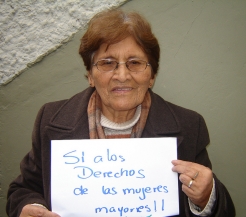By Rosaleen Cunningham
 International Women’s Day was marked for the first time in Austria, Denmark, Germany and Switzerland, where more than one million women and men attended rallies.
International Women’s Day was marked for the first time in Austria, Denmark, Germany and Switzerland, where more than one million women and men attended rallies.
In addition to the right to vote and to hold public office, they demanded women’s rights to work, to vocational training and to an end to job discrimination.
Since those early years, International Women’s Day has become a rallying call for women in developed and developing countries alike to build support for women’s rights and participation.
It is a time to reflect on progress made, to call for change and to celebrate acts of courage and determination by ordinary women. They have played an extraordinary role in the history of their countries and communities.
Older activists’ International
Women’s Day messages
Lobbying UN Women
The growing international women’s movement was strengthened on 1 January 2011 by the establishment of a new agency for women, UN Women.
Its Executive Director is former Chilean President, Michelle Bachelet who says, “UN Women will significantly boost UN efforts to expand opportunities for women and girls and tackle discrimination around the globe.”
HelpAge is campaigning to ensure that these efforts include older women.
In 2010 we lobbied Ms Bachelet to urge her to engage with civil society and commit to older women’s rights.
And UN Women has a responsibility to see that inter-governmental standards on gender equality are implemented by governments. This includes the recent CEDAW recommendation on older women’s rights.
Hopes for the future
Ms Bachelet’s comments on what she sees UN Women doing for older women bode well for the future.
“Empowering older women will be high on my agenda,” she said recently at the UN Commission for Social Development. “We do not intend to treat older women as victims,” she added.
She also emphasised that acknowledging the following issues was essential for older women’s rights:
- The pressing need to find innovative ways to break the cycle of poverty amongst the growing number of older women.
- A focus on employment of women throughout their lifecycle and in lifelong education, training and access to IT.
- The world needs to enable women and girls to make the transition to old age in a way that allows them to capture social and political opportunities and to have a voice.
- Addressing the issue of care – older women are the caretakers of the sick and the dying often with no means of support.
- Older women are the most politically active, the custodians of wealth, knowledge and traditions and key to intergenerational solidarity.
Want to know more?
Watch a video clip of Ms Bachelet’s presentation at the UN Commission for Social Development.
Read our letter to UN women. (5.6kb).
Read more about older people’s rights.
Read Margaret’s blog on International Women’s Day
